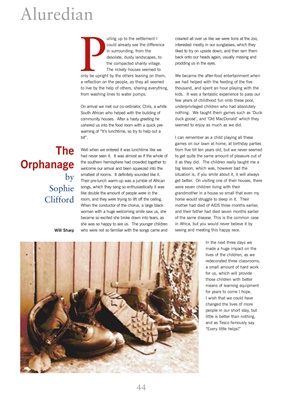
Aluredian
43
M
ichael Faraday
(1791-1867) was an
English scientist who
was born on the
22nd of September.
He was referred to,
by some historians, as the best experimentalist
in the history of science. Even though when he
was young, he was brought up in a poor
society and being one of four children, Faraday
only received the most basic of school
educations. In the end he had largely to
educate himself. His father, James Faraday,
had been the village blacksmith. Do his
discoveries contribute to today's society?
As a physicist, he studied magnetism and
established the basis for the magnetic field
concept in physics. Furthermore, he was best
known for his discoveries of electromagnetic
induction and of the laws of electrolysis. Due
to his efforts, electricity became viable to use in
technology; and because he had accomplished
many things, the 'farad', which measures
capacitance - an amount of electrical charge -
was named after him.
I couldn't contain excitement within me, I was
ready unleashed all my discoveries. I had
achieved so many things that no one had ever
found before. But this was only the beginning
- I was fanatical about it; I couldn't control it.
When I look back at my past, I astound myself
of how far I have come, how I have broken free
from the 'undeserving poor', its grasp can't hold
me back anymore - I now had the knowledge to
progress and uncover more mysteries.
Faraday then went on to inventing an early
form of what was soon to be known as the
'Bunsen Burner' - which has been used,
almost universally, in laboratories as a
convenient source of heat. This invention
helped him popularise the terminology, such
as: anode, cathode, electrode and ion.
For many years I worked frantically around my
laboratory. I succeeded in liquefying several
gases, investigating the alloys of steel and
many new kinds of glass - intended for
optical purposes.
The two scientists, Davy and William Hyde
Wollaston, attempted to design an electric
motor but, making no progress with any
results, they consulted on the matter with
Faraday.
I seized this opportunity with alacrity. So
when I succeeded and had published the
results I selfishly took all the credit for my
wondrous discovery, without acknowledging my
debt to them. As a result, I was prohibited
from doing any physics for seven years. Some
believed they wanted to slow my rise as a
scientist.
In experimenting with magnetism, Faraday
made two discoveries of great importance. One
was the existence of diamagnetism, and also,
that a magnetic field has the power to rotate
the plain of polarised light passing through
certain types of glass - a magnet could affect
rays of light. Faraday then constructed the
electric dynamo which later became the
ancestor of the modern power generators.
He said: "Nothing is too wonderful to be true
if it be consistent with the laws of nature;
experimentation is the best test of such
consistency". Towards the end of Faraday's
triumphant career, his proposal was that
electromagnetic forces extended into the empty
space around the conductor. However, this
was rejected by his associates.
When you believe in something so strongly
and then that idea is discarded, it feels as if
all that you have worked towards, all that
experience has all been for nothing. You
expect them to trust you and let you go on and
pursue that discovery. After a while, you then
wake up to reality and begin to doubt yourself;
have I now found all that I am capable of
finding?
He never lived to see them finally accept his
idea. They realised that his mental model was
crucial to the successful development of
electromechanical devices which dominated
engineering and industry for the remainder of
the 19th century. If Michael Faraday hadn't
been so enthusiastic about his work, the things
he had uncovered and invented would not have
been available to us nowadays. His discoveries
do contribute to today's society.
Michael
Faraday
by
Amelia Evans